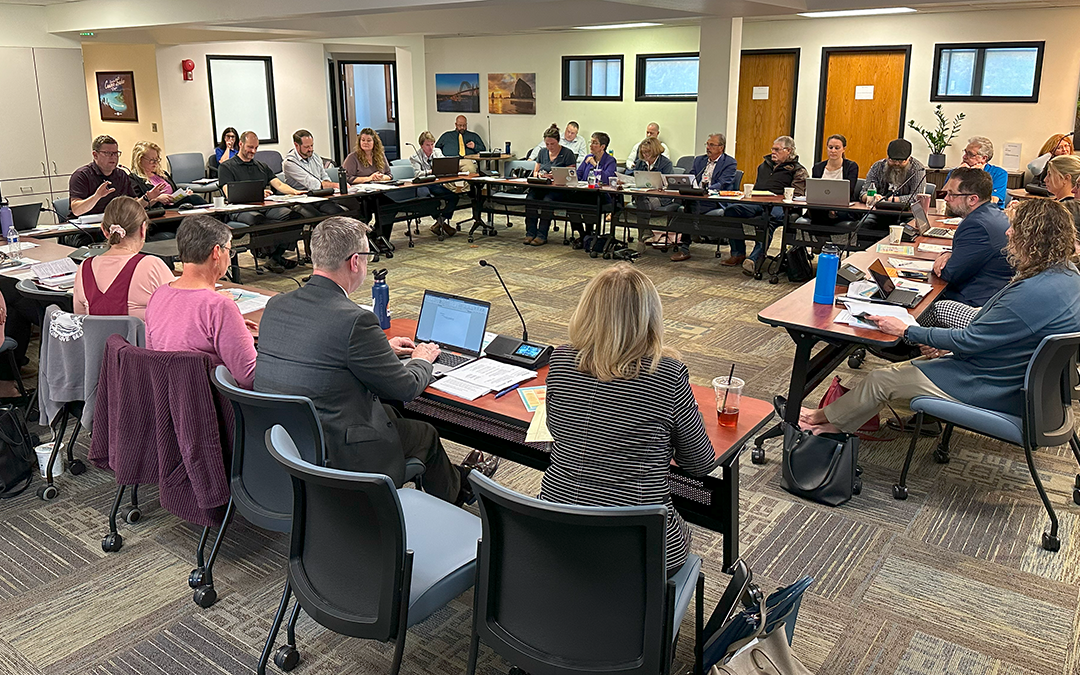
Mar 28, 2024 | AOC Advocacy, Governance, Revenue, & Economic Development
Counties are among the organizations now eligible to apply for grant awards under the $157 Million Broadband Deployment Program (BDP). Applications must be submitted by Thursday, April 25, at 5 p.m. (PST) to be considered for grant funding. Projects eligible include the construction and deployment of broadband infrastructure in locations that are unserved or underserved. Read the full press release from Business Oregon announcing the application process here. You may also contact your region’s Broadband Project Coordinator for support in the application process by emailing broadband.oregon@biz.oregon.gov.
For more information, visit the Oregon Broadband Office webpage.
Contributed by: Legislative Affairs Manager Jen Lewis-Goff

Mar 27, 2024 | AOC Advocacy, AOC News, Health & Human Services, Public Safety & Veterans
The short, fast-paced 2024 legislative session ended with real wins for the Association of Oregon Counties (AOC) public safety portfolio. AOC’s Public Safety Steering Committee identified two priorities in advance of the session — increasing state investment in community corrections for the remainder of the 23-25 biennium, and elevating the county voice and role in Ballot Measure 110 reform conversations. Both of these priorities were achieved due to the ongoing advocacy of AOC members.
Community corrections funding
This past fall AOC heard from counties across the state that funding for community corrections was at a critical breaking point. In response, the AOC Public Safety Steering Committee prioritized increased state investments in community corrections funding for the remainder of the 23-25 biennium in the 2024 short session.
Thanks to advocacy from AOC members and community corrections directors, the legislature recognized this critical need and appropriated the requested amount. HB 5204 includes $16 million allocated to the Oregon Department of Corrections for grant-in-aid funding to counties specific to community corrections funding. AOC and other partners have committed to coming to the table over the interim to collaborate on a new funding formula for community corrections, ensuring that future funding formulas are better reflective of current populations coming through community corrections.
Addressing the fentanyl crisis
In addition to community corrections needs, the AOC Public Safety Steering Committee also prioritized Measure 110 reforms in the 2024 legislative session. Specifically, our members asked AOC to elevate the county voice in Measure 110 reform, supporting policy modifications that prioritize engagement in substance abuse treatment, provide sufficient funding for county services, and strengthen tools the criminal justice system can use to fight illegal drug use and sales.
The legislature passed two bills related to Measure 110 reform — House Bill 4002: Measure 110 Reform Policy Package, and House Bill 5204: Measure 110 Reform Funding Package.
AOC staff worked closely throughout session with public safety partners and legislative leadership consistently communicating how potential Measure 110-related policy changes would affect counties. AOC staff advocated for appropriate funds and capacity building at counties, while also pushing for maintaining the integrity of counties’ local mental health authority. AOC President Danielle Bethell testified on behalf of AOC in front of the Joint Committee on Addiction and Community Safety Response during a public hearing on HB 4002 and relayed AOC’s position, which was also submitted as written testimony. AOC is grateful to our members, partners, and the legislature for passing meaningful legislation and centering counties in the policy development process and policy implementation. View a comparison of AOC adopted principles with the final bill outcomes here.
HB 5204 allocates more than $110 million to counties and county-related programs for infrastructure projects, standing up deflection programs, supporting specialty courts, funding community corrections, and more. HB 4002 creates a new PCS-U misdemeanor for possession of a controlled substance, and offers pathways to expungement, dismissal, or no charges filed. Deflection programs will be created and coordinated at the county level, with public safety and behavioral health partners working together. Access a visual flowchart of how deflection works here. Twenty-three counties have indicated interest in setting up a deflection program. AOC will continue to keep our members informed on the progress of HB 5204 funding and HB 4002 deflection program implementation through regular meetings and email communications.
Contributed by: Legislative Affairs Manager Jen Lewis-Goff

Mar 27, 2024 | AOC Advocacy, AOC News, Natural Resources
In November 2017, the Oregon Board of Forestry (BOF) directed staff to evaluate whether the pursuit of a Habitat Conservation Plan (HCP) in conjunction with the issuance of incidental take permits made sense from a ‘business perspective.’ Specifically, BOF staff sought to determine whether the HCP could meet their twin goals of ensuring financial security for those that obtain revenues through harvest and providing adequate habitat for the 15 species targeted for mitigation by the department. The BOF voted to continue the HCP development process upon receiving the Business Case Analysis in 2018. As a first step, the Oregon Department of Forestry (ODF) prepared a Comparative Analysis between three different management plans: the current forest management plan, a draft revised forest management plan, and the proposed HCP. Upon reviewing the report, the BOF convened and directed staff to continue the process and requested a National Environmental Policy Act (NEPA) analysis from the federal services. The NEPA analysis was released in March of 2022.
During every stage of the HCP development, the Forest Trust Land Advisory Committee (FTLAC) received information regarding the proposed modeled average annual harvest volumes generated from the lands deeded to the state in trust for long term management and Greatest Permanent Value. Over the past seven years, trust land county commissioners became more and more concerned with the continued reduction in proposed harvest (see habitat conservation area maps). Timber harvest not only generates general operating revenues for county governments, special districts, and schools, but the industry provides family wage jobs in their communities.
Trust land counties have a 10-year average of 249 million board feet (MMBF). The harvest projections under the proposed HCP decreased from 250 MMBF to 225 MMBF. The projections dropped again to 165-180 MMBF in the Implementation Plans and most recently the December 2023 modeling projections are 161-182.5 MMBF.
Pursuant to ORS 526.156, FTLAC is allocated time on every BOF Agenda to testify on the management of their deeded trust lands. While the FTLAC chair and vice chair have always testified, in March and before the final HCP vote was to occur, all five FTLAC commissioners testified. Many counties also submitted written letters in opposition of the current plan as drafted.
Coos County Commissioner and FTLAC Chair John Sweet, discussed the disappointment counties had in not being included in putting the plan together and how the plan could have been supported by all parties impacted if changes were made. Clatsop County Commissioner Courtney Bangs discussed the fiscal impacts counties will feel as well as the impacts not harvesting will have in management practices and wildfire potential. Columbia County Commissioner Margaret Magruder discussed the financial impact the proposed HCP would have on schools, the state’s overall budget, and the operating revenues at the Department of Forestry. Linn County Commissioner Will Tucker discussed the economics locally of the plan as drafted; and Tillamook County Commissioner and FTLAC Vice Chair Erin Skaar highlighted the challenges counties will face seeking funding from the Legislature and how the BOF and ODF should view counties as partners.
The Board of Forestry ended up voting to move the HCP forward on a vote 4-3.
Contributed by: Legislative Affairs Manager Branden Pursinger

Mar 26, 2024 | AOC Advocacy, Health & Human Services
Addressing Oregon’s opioid crisis and reforming Ballot Measure 110 were among top priorities for legislators during the 2024 short session. HB 4002 and its companion funding bill, HB 5204, passed the legislature overwhelmingly with bipartisan, bicameral support, instituting a variety of new programs and policies. Among those new programs is the Oregon Behavioral Health Deflection Program, established at the Criminal Justice Commission (CJC) to coincide with the newly created misdemeanor for possession of a controlled substance.
The new misdemeanor, coupled with the deflection program, is intended to re-establish local partnerships between law enforcement and the behavioral health safety net to effectively connect individuals to treatment and recovery while minimizing costly interactions with the justice system.
Twenty-three Oregon counties opted in to receive fast-tracked funding to stand up deflection programs. These counties are encouraged to establish their deflection programs quickly in preparation of the new misdemeanor’s effective date of Sept. 1. Initial funds may also be used as planning grants for counties needing time to explore programmatic options. The legislature also allocated funding through the end of the current biennium to support the coordination and case management of deflection program participants in each county and federally recognized Oregon tribe, which means every interested county government still has the opportunity to draw down their formula funding to set up a program.
The Association of Oregon Counties (AOC) was successful in advocating for maximum flexibility in how a local deflection program is administered and operated, allowing the required local partners (law enforcement, the district attorney, county government, the Community Mental Health Program, and a Behavioral Health Network provider) to make the best use of their existing resources and processes.
Over 150 county leaders attended AOC’s first deflection program summit on March 18, designed to help county commissioners and local partners understand the CJC’s program requirements and timeline, as well as equipping county leaders to begin formulating their local implementation plans. The summit’s plenary and regional break-out session recordings and materials are available in the AOC archive.
AOC will continue to convene the CJC, county commissioners, and local deflection partners through the summer and fall to assist in program planning and implementation. Please contact jpratt@oregoncounties.org or jlewis-goff@oregoncounties.org to receive those meeting notifications.
Contributed by: Legislative Affairs Managers Jessica Pratt and Jen Lewis-Goff

Mar 26, 2024 | AOC Advocacy, AOC News, Transportation
Until the passage of Senate Bill 1566 during the 2024 short session, Oregon law prohibited counties from charging fees for permits issued to water, gas, electric, and communications utilities for construction, repair, or maintenance work in the county right of way.
The statutory preemption on permit fees meant that precious State Highway Fund dollars intended for county road improvements and maintenance were instead subsidizing public and private utility operations. The Association of Oregon Counties (AOC) and the Oregon Association of County Engineers and Surveyors (OACES) have prioritized the lifting of this preemption through legislative action for several legislative sessions.
The concept was introduced as SB 635 in the 2023 session, and AOC participated in a months-long work group with utilities that was ultimately fruitless. Before the end of the 2023 session, AOC successfully advocated for an interim committee work group sanctioned by the Joint Committee on Transportation. That workgroup was led by committee co-chair Sen. Chris Gorsek and committee member Sen. Lynn Findley. Five county representatives participated in several meetings around the state during the interim and negotiated the language that became SB 1566, which was introduced as one of the Joint Committee on Transportation’s three short session bills. AOC and counties are grateful to staff and commissioners from Multnomah, Polk, Union, Jefferson, and Lincoln counties and the leadership and dedication from Sens. Gorsek and Findley, without whom SB 1566 would not have passed.
SB 1566 removes the preemption in ORS 758.010 and allows counties to charge cost-recovery fees for permits issued to the utilities that could previously operate in the county right of way free of charge. The language includes negotiated permit fee exemptions for vegetation management, routine maintenance, and emergencies. Completed fee-eligible permits must be approved or denied by the county within 15 days. SB 1566 sunsets in 2031, so the legislature will have to review and renew the authority it provides to counties in a future session.
SB 1566 is permissive — if a county wishes to pursue the fee structure the bill authorizes, it must pass an ordinance. SB 1566 contains language that allows a county to begin ordinance development immediately, and includes an emergency clause so it will be in effect upon the governor’s signature. AOC and OACES will create opportunities to collaborate on ordinance development and track the efficacy of this new authority over the next five years.
Contributed by: Legislative Affairs Director Mallorie Roberts

Mar 26, 2024 | AOC Advocacy, AOC News, Governance, Revenue, & Economic Development
Following House Bill 3414’s failure during the 2023 session, the prospect of the Association of Oregon Counties (AOC)’s community development policy priority — creating a fast-track process for limited urban growth boundary (UGB) expansions that significantly increase affordable and workforce housing in all communities experiencing shortages of buildable land — looked grim. However, immediately following the 2023 session, Governor Kotek and her policy advisors convened a small group of individuals, including AOC staff, to conduct a series of work sessions. Their aim was to revisit the policy items in HB 3414 and craft a bill to address Oregon’s housing supply crisis that could pass in the 2024 session.
After numerous meetings with the governor’s office, AOC staff and county planning department directors provided input and technical assistance on proposed legislation to ensure cities and counties would be able to implement the legislation if enacted. In consideration of the pending legislative concept, the AOC Transportation and Community Development Steering Committee recommended that AOC readopt our 2023 UGB-related priority as a top priority for the 2024 session.
Senate Bill 1537, the Emergency Housing Stabilization and Production Package introduced by Gov. Kotek, was amended many times before eventually becoming law, with AOC actively involved at every stage of the process.
SB 1537 directly addresses AOC’s fast-tracked UGB expansion priority, establishing a one-time UGB expansion tool for cities that need both land supply and affordable housing. The bill requires 30% of all homes to be built as “affordable housing” and ensures the expansion aligns with the preferences and understanding of Oregonians – with a diverse array of housing choices, a mix of densities and services the residents will need, and the necessary infrastructure for long lasting, successful communities. SB 1537 requires the land to not be zoned high-value farm or forest outside of urban reserves already designated and caps the expansion at a specific number of acres based on population (100 net residential acres for cities with a population over 25,000 and a maximum of 50 net residential acres in cities with a population under 25,000; Metro is capped at 300 total net residential acres).
Cities are currently looking over the requirements that must be met to qualify for this fast-track process. With counties serving as a strong partner in this process, planning departments stand ready to work with our local government partners to begin this process when they are ready.
AOC looks forward to working with the Department of Land Conservation and Development, the governor’s office, and stakeholders throughout the state on the next area needed to address the housing supply issues Oregon continues to face.
Contributed by: Legislative Affairs Manager Branden Pursinger






